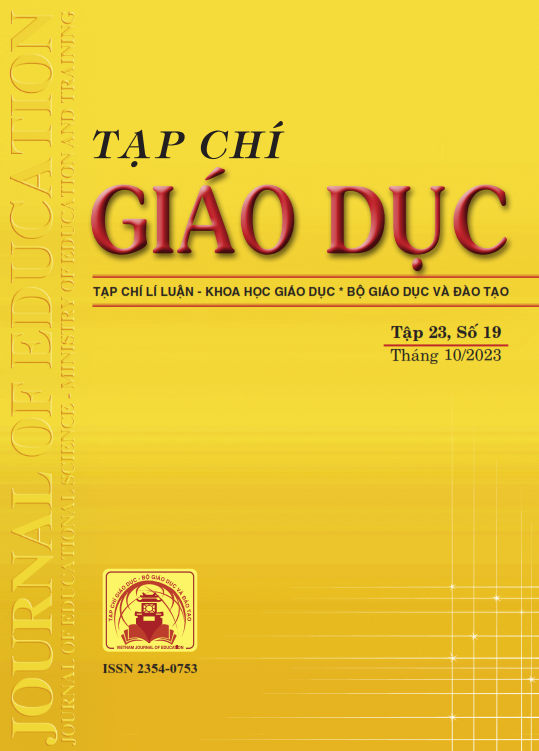Phát triển ngân hàng câu hỏi trắc nghiệm thích ứng đánh giá từ vựng tiếng Anh thông dụng: áp dụng IRT và phương pháp cân bằng đề
Tóm tắt
In the context of language education in Vietnam, while computerized adaptive testing can be seen as an inevitable development trend in the 4.0 era, only few studies have been published on this topic, including those on UEd-CAT 1.0 - an adaptive testing system of the University of Education - Vietnam National University, Hanoi. This study was conducted to build a standardized item bank to evaluate the Vietnamese EFL learners’ knowledge of English high-frequency vocabulary. After the steps of writing 552 items and getting the items evaluated by item writing experts, the authors carried out a try-out with the participation of 1619 university students, analyzed the quality, calibrated the items with the Rasch model, equated the test forms to set item parameters onto a single scale, edited and finalized the item bank of 522 standardized questions. This question bank is believed to meet the requirements of the UEd-CAT 1.0 system, contributing to the content development of the system and to the EFL teaching and learning practices in Vietnam.
Tài liệu tham khảo
Bui, T. K. P., Nguyen, Q. T., & Le, T. H. (2022). The development of A Vietnamese-English Bilingual Version of the New General Service List Test. 2nd Hanoi Forum on Pedagogical and Educational Sciences, Hanoi, Vietnam.
Canale, M. (1986). The promise and threat of computerized adaptive assessment of reading comprehension. In C. Stansfield (ed.), Technology and language testing (pp. 30-45). Washington, DC: TESOL Publications.
Choi, Y., & McClenen, C. (2020). Development of adaptive formative assessment system using computerized adaptive testing and dynamic bayesian networks. Applied Sciences, 10(22), 8196. https://doi.org/10.1016/j.caeai.2022.100104
Dang, T. N. Y. (2020). Vietnamese non-English major EFL university students' receptive knowledge of the most frequent English words. VNU Journal of Foreign Studies, 36(3).
David, A., & Ida, M. (2019). A Course in Rasch Measurement Theory: Measuring in the Educational, Social and Health Sciences. Springer.
Khoshsima, H., & Toroujeni, S. M. H. (2017). Computer Adaptive Testing (Cat) Design; Testing Algorithm and Administration Mode Investigation. European Journal of Education Studies, 3(5). https://doi.org/10.5281/zenodo.576047
Le, T. C. N, & Nation, P. (2011). A Bilingual Vocabulary Size Test of English for Vietnamese Learners. RELC journal, 42(1), 86-99. https://doi.org/10.1177/0033688210390264
Le, T. H., & Nguyen, T. H. (2021). Experimental Research and Application of Computerized Adaptive Tests to assess Learners’ Competencies. 2021 3rd International Conference on Computer Science and Technologies in Education (CSTE), Beijing, China. https://doi.org/10.1109/CSTE53634.2021.00021
Le, T. H., Tang, T. T, Tran, L. A., Nguyen, T. D., Nguyen, P. A., & Nguyen, T. Q. G. (2019). Developing Computerized Adaptive Testing: An Experimental Research on Assessing the Mathematical Ability of 10th Graders. VNU Journal Of Science: Education Research, 35(4). https://doi.org/10.25073/2588-1159/vnuer.4301
Loyd, B. H., & Hoover, H. D. (1980). Vertical equating using the Rasch model. Journal of Educational Measurement, 17(3), 179-193. https://doi.org/10.1111/j.1745-3984.1980.tb00825.x
Nguyễn Quỳnh Giang, Lê Thái Hưng (2018). Mô phỏng một bài kiểm tra thích nghi trên máy tính thông qua phần mềm R. Tạp chí Khoa học Giáo dục Việt Nam, 11, 6-11.
Nguyễn Thái Hà, Vũ Trọng Lưỡng, Lê Thái Hưng, Phạm Văn Hoằng (2021). Thiết kế câu hỏi trắc nghiệm thích ứng nhằm đánh giá năng lực toán học của học sinh lớp 12. Tạp Chí Giáo dục, 508(2), 33-40.
Nguyen, T. M. H., & Webb, S. (2017). Examining second language receptive knowledge of collocation and factors that affect learning. Language Teaching Research, 21(3), 298-320.
Okhotnikova, A., Daminova, J., Muzafarova, A., & Rasskazova, T. (2019). Challenges of designing and administering computer-adaptive tests. In 13th International Technology, Education and Development Conference (INTED) (pp. 5633-5636). International Academy of Technology, Education and Development.
Oppl, S., Reisinger, F., Eckmaier, A., & Helm, C. (2017). A flexible online platform for computerized adaptive testing. International Journal of Educational Technology in Higher Education, 14(1), 1-21. https://doi.org/10.1186/s41239-017-0039-0
Pathan, M. M. (2012). Computer Assisted Language Testing [CALT]: advantages, implications and limitations. Research Vistas, 1(4), 30-45.
Şahin, A., & Weiss, D. J. (2015). Effects of calibration sample size and item bank size on ability estimation in computerized adaptive testing. Educational Sciences: Theory & Practice, 15(6).
Thompson, N. A., & Weiss, D. A. (2011). A framework for the development of computerized adaptive tests. Practical Assessment, Research, and Evaluation, 16(1). https://doi.org/10.7275/wqzt-9427
Webb, S. A., & Chang, A. C. S. (2012). Second language vocabulary growth. RELC Journal, 43(1), 113-126.
Tải xuống
Đã Xuất bản
Cách trích dẫn
Số
Chuyên mục
Giấy phép

Tác phẩm này được cấp phép theo Ghi nhận tác giả của Creative Commons Giấy phép quốc tế 4.0 .












